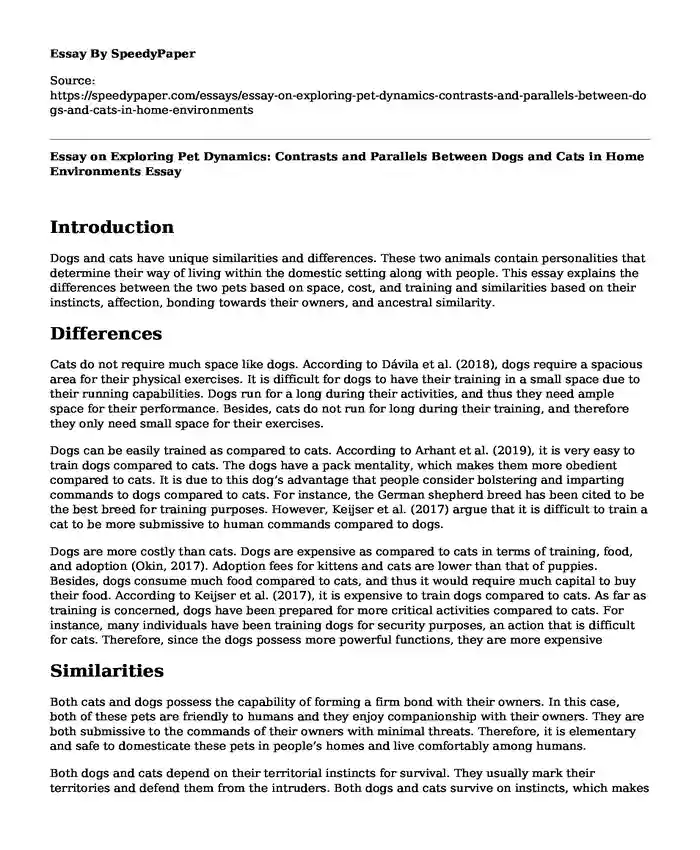
| Essay type: | Compare and contrast |
| Categories: | Animals |
| Pages: | 3 |
| Wordcount: | 683 words |
Introduction
Dogs and cats have unique similarities and differences. These two animals contain personalities that determine their way of living within the domestic setting along with people. This essay explains the differences between the two pets based on space, cost, and training and similarities based on their instincts, affection, bonding towards their owners, and ancestral similarity.
Differences
Cats do not require much space like dogs. According to Dávila et al. (2018), dogs require a spacious area for their physical exercises. It is difficult for dogs to have their training in a small space due to their running capabilities. Dogs run for a long during their activities, and thus they need ample space for their performance. Besides, cats do not run for long during their training, and therefore they only need small space for their exercises.
Dogs can be easily trained as compared to cats. According to Arhant et al. (2019), it is very easy to train dogs compared to cats. The dogs have a pack mentality, which makes them more obedient compared to cats. It is due to this dog’s advantage that people consider bolstering and imparting commands to dogs compared to cats. For instance, the German shepherd breed has been cited to be the best breed for training purposes. However, Keijser et al. (2017) argue that it is difficult to train a cat to be more submissive to human commands compared to dogs.
Dogs are more costly than cats. Dogs are expensive as compared to cats in terms of training, food, and adoption (Okin, 2017). Adoption fees for kittens and cats are lower than that of puppies. Besides, dogs consume much food compared to cats, and thus it would require much capital to buy their food. According to Keijser et al. (2017), it is expensive to train dogs compared to cats. As far as training is concerned, dogs have been prepared for more critical activities compared to cats. For instance, many individuals have been training dogs for security purposes, an action that is difficult for cats. Therefore, since the dogs possess more powerful functions, they are more expensive
Similarities
Both cats and dogs possess the capability of forming a firm bond with their owners. In this case, both of these pets are friendly to humans and they enjoy companionship with their owners. They are both submissive to the commands of their owners with minimal threats. Therefore, it is elementary and safe to domesticate these pets in people’s homes and live comfortably among humans.
Both dogs and cats depend on their territorial instincts for survival. They usually mark their territories and defend them from the intruders. Both dogs and cats survive on instincts, which makes them possess the ability to stay in the wilderness. In this case, these pets can survive outside their domestic territories. They can defend themselves from hostile environments and find their food without depending on human beings.
Conclusion
In conclusion, on the one hand, dogs require a more spacious area as their territory compared to cats. It is deemed to be easier to train dogs than cats. It is less costly to domesticate cats than dogs. Dogs require a lot of food and maintenance compared to cats. On the other hand, dogs and cats have a similarity in that they both have the capability of forming social bonds with their owners. Besides, they both have territorial instincts.
References
Arhant, C., Hörschläger, N., & Troxler, J. (2019). Attitudes of Veterinarians and Veterinary Students to Recommendations on How to Improve Dog and Cat Welfare in Veterinary Practice. Journal of Veterinary Behavior, 31, 10-16. https://www.sciencedirect.com/science/article/pii/S1558787818302223
Dávila, I., DomínguezOrtega, J., NavarroPulido, A., Alonso, A., AntolínAmerigo, D., GonzálezMancebo, E., ... & Rosado, A. (2018). Consensus Document on Dog and Cat Allergy. Allergy, 73(6), 1206-1222. https://onlinelibrary.wiley.com/doi/pdf/10.1111/all.13391
Keijser, S. F. A., Meijndert, L. E., Fieten, H., Carrière, B. J., Van Steenbeek, F. G., Leegwater, P. A. J., ... & Nielen, M. (2017). Disease Burden in Four Populations of Dog and Cat Breeds Compared to Mixed-Breed Dogs and European Shorthair Cats. Preventive Veterinary Medicine, 140, 38-44. https://dierenartsapeldoorn.nl/wp-content/uploads/sites/33/2019/04/Keijser-Meijndert-et-al.-2017-PVM-Disease-burden-in-four-population....pdf
Okin, G. S. (2017). Environmental Impacts of Food Consumption by Dogs and Cats. PLoS One, 12(8), e0181301. https://journals.plos.org/plosone/article?id=10.1371/journal.pone.0181301
Cite this page
Essay on Exploring Pet Dynamics: Contrasts and Parallels Between Dogs and Cats in Home Environments. (2023, Dec 07). Retrieved from https://speedypaper.com/essays/essay-on-exploring-pet-dynamics-contrasts-and-parallels-between-dogs-and-cats-in-home-environments
Request Removal
If you are the original author of this essay and no longer wish to have it published on the SpeedyPaper website, please click below to request its removal:
- Free Essay Example about Zoos and Their Role
- Mobile App for Diagnosing and Identifying Drugs for Animal Treatment. Free Essay
- Essay Sample on The Hawaiian Case
- Essay on Effective Disaster Management Strategies for Public Health Systems
- Essay on Exploring Pet Dynamics: Contrasts and Parallels Between Dogs and Cats in Home Environments
- Exploring Consciousness: A Comparative Analysis of Human and Animal Minds - Free Report
- Health Concern of French Bulldog Breed - Essay Sample
Popular categories




